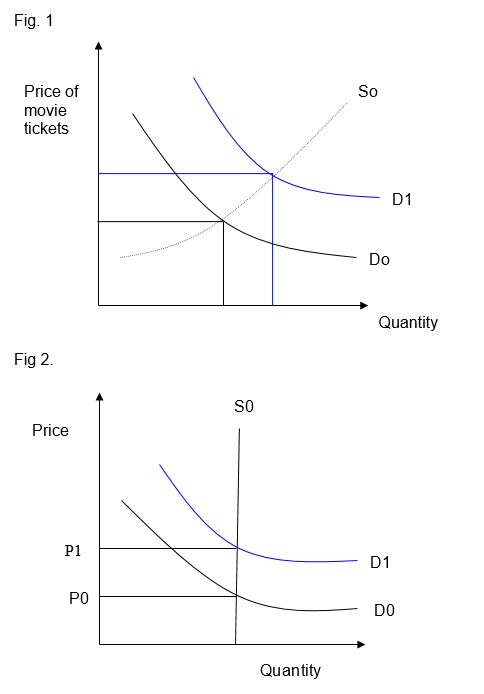Introduction
Economist have over time identified the difference in behavior of goods and that of the market and people in how they react to market forces and more so supply, demand and pricing. As a result goods and services have been classified either as normal or inferior or other classifications derived from the normal demand and supply curve. This paper looks at the behavior of the movie theaters as product/service in the market.
Reasons for higher movie ticket prices on weekends and week nights
Economics academicians have always been baffled at the disregard of economic principles and ideologies by the behavior in movies and cinema consumers and definitely their suppliers. Movie theatres have continuously made use of this economic anomaly where higher prices do not lead to a fall in demand as the law of demand dictates for normal goods. But one thing for sure is that leisure goods do not take the route taken by normal goods in response to unit changes in price henceforth called elasticity of demand of movie tickets to price changes.
It has been observed timing plays a very significant role in determining how demand and pricing of movie tickets is structured (Brue, and McConnell, 2005). During weekday afternoon shows, charges are lower than for a weeknight or weekend.
For once we can deduce that movie theatres are very aware of our daily and weekly schedules. If not, why then not offer shows in the morning? They have noted that our culture, tastes and fashion trend dictates that one consumes leisure products in our free time in this context watching movies at the movie theatres. To some, work is throughout the week hence consuming leisure during weekends while some can afford to indulge in leisure activities during the weeknights and weekday afternoons. A closer look at the trend the movie theatres follow is that they have numerous shows during the weekends as demand is high and the prices are also high.

From the fig 1, we have the demand curve for movies during the afternoons as D0, for weeknights and weekendsD1 and the supply curve as S0. Therefore, supply increases with demand. Demand D0 on the other hand will shift upwards to signify an increase in demand caused by other factors other than price and supply changes. As a result prices will increase from P0 to p1
We would expect that the supply of movies to be constant it has been observed that there are more movie shows during the weekends and night weeks than in weekday afternoons. This is represented by fig 2 which shows constant supply of movie shows as S0 and the demand curve for movies in the afternoon as D0 and during weekends and night weeks as D1
On the other hand we can view time spent viewing movies as a substitute to working hours. This means that an increase in labor wages (hourly wage rates) will reduce the number of hours for movie consumption hence a fall in demand. In realization of this, the movie theatres have set the prices of shows in the weekday afternoons at lower prices since they compete with working hours more than during the weeknights and weekends. Alternatively, demand for leisure is higher during non-working hours set at night and weekends (Brue, and McConnell, 2005). In addition, increased wages lead to increased demand for leisure in this case movie tickets but in this context it does not seem to count.
Impact of findings
Acting in a rational manner, I am personally supposed to take advantage of the low prices during the afternoon and watch movies at that time. Unfortunately, this is not the case as other commitments limit consumption of leisure at this hour as a student. As much as I might be tempted to take advantage of the low prices during the day, I cannot forego my classes to attend movies. Therefore, I will have to contend with the higher prices or otherwise decide on purchasing DVD’s themselves.
Price elasticity demand in movie tickets
The assumption here is that demand for movie tickets is not sensitive to price changes. Why? Going by the definition of elasticity, the percentage change in one variable as a result of a 1% change in another variable, then demand for movie tickets is observed not to change as a result of a percentage change in prices for movie tickets during weeknights and weekends.
References
Brue, Stanley and McConnell, Campbell (2005). Essential of Economics, New York: McGraw Hill.